#ozai meta
Explore tagged Tumblr posts
Text
I feel one of the scariest things about Ozai is not necessarily the physical abuse he pulls on Zuko or Azula. It's the mental abuse and how under the radar it is.
Yes, it is easy to look at Zuko's scar and be horrified by his abuse. What I feel is more effective was that Ozai made Zuko believe that he deserved it. That he had to go on this three-year odyssey to try and find the Avatar for a chance at gaining his love back. Their reunion isn't about Ozai apologizing. It's Ozai saying how proud he is of Zuko for making up for HIS mistake. He doesn't mention the Agni Kai at all, and when Zuko does turn, he tries to make it sound like some exercise in learning respect.
Same thing with Azula. Ozai puts the mantle of Fire Lord on her shoulders, effectively giving her the responsibility of running a country. He puts on so much pressure to have her to be perfect (pitting her against Zuko, sending her out on missions). The only approval that he gives is for her performance which reflects on him. Basically, he treats her more like an asset more than as a person. And any failing she makes is on her part.
He puts so much responsibility on both Zuko and Azula, but never takes any for himself. So if they displease his high expectations, that's their fault.
And they believe him.
#ozai#ozai atla#zuko#zuko meta#ozai meta#azula#princess azula#azula meta#fire lord ozai#atla#avatar the last airbender#atla meta
861 notes
·
View notes
Note
Taking those awful comics into account, I have zero clue why Ozai simply didn't kill Zuko after Ursa left. It's clear at this point Zuko is a 'disappointment' and Azula is passing expectations with flying colors. If anything Ozai should've been looking at Zuko sideways when he realized Zuko isn't catching up like he wants and trying to get rid of him so Azula can take his spot as she is more useful. Just wait a few months when Azulon's death dies down, let Zuko have a totally not staged 'accident' and boom, Azula is heir, problem child out of the way, Ozai gets what he wants with zero drawback.
Yeah, it doesn't make sense for a comics Ozai to keep Zuko alive, other than that Ozai probably still wanted to keep his only male heir.
In the show, though, there are more explanations to this.
The thing is, this would be a logical thing to do IF Ozai wanted to get rid of Zuko. Interestingly, though, in the show, Ozai actually wanted to make Zuko his heir. Yes, Zuko didn't meet his expectations, but when Ozai found out that Zuko supposedly killed the avatar and helped Azula take Ba Sing Se, he immediately accepted him as his heir and during the meeting, Zuko was at Ozai's right hand.
Ozai hated Zuko, because he wasn't a capable heir in his eyes, but deep down, he wanted Zuko to be one. And as soon as Zuko "became" the prince Ozai would approve of, Ozai instantly gave him his approval and support, even if it was purely conditional.
Azula was likely a last resort for Ozai, if Zuko would prove himself as completely untrustworthy. And it shows, given that he named Azula Fire Lord only after Zuko betrayed the FN and Azula herself is rather surprised that Ozai gave her this title.
Also, another reason why I think Ozai didn't kill Zuko in the show, is that it was hinted that Ursa and Ozai had a good early relationship. He didn't kill Zuko after she left, bacause he had likely promised Ursa that Zuko won't die and maybe he kept this promise out of some feelings he still had left for Ursa.
#atla#asks#answering asks#atla ozai#zuko#fire lord ozai#ozai meta#sorta?#azula#ursa#fire nation royal family
79 notes
·
View notes
Text

@rufftoon
Shadow Empire on deviantart
#whyiznoonetalkingaboutit#not my art#ozai#atla#atla ozai#fire lord ozai#ozai meta#Shadow Empire#rufftoon#on deviantart#canon divergence#webcomic
20 notes
·
View notes
Text
Respect and the Zuko-Ozai Agni Kai
"The Storm"
Iroh: Iroh After Zuko's outburst in the meeting, the Fire Lord became very angry with him. [Flashback quickly ends.] He said the challenge against the general was an act of complete disrespect! And there was only one way to resolve this. Iroh: That's right. Zuko looked upon the old general he had insulted and declared that he was not afraid. But Zuko misunderstood... Zuko had spoken out against the general's plan, but by doing so in the Fire Lord's war room, it was the Fire Lord whom he had disrespected. Ozai: You will fight for your honor. Young Zuko: [Frontal shot; kneels on his knees and forearms, while looking at the floor.] I meant you no disrespect. [Gazes up at his father, tears shimmering in his eyes as his voice starts to waver.] I am your loyal son. Ozai[: Far off frontal shot of Zuko as Ozai's shadow and eventually his head come into view.] Rise and fight, Prince Zuko! Ozai: You will learn respect, [Zuko pushes himself up on his knees and hands. Cut to a frontal shot of Zuko as he starts to shake.] and suffering will be your [Zuko looks up at Ozai, tears streaming down his face.] teacher. Iroh: It was no accident. After the duel, the Fire Lord said that by refusing to fight, Zuko had shown shameful weakness. As punishment, he was banished and sent to capture the Avatar. Only then could he return with his honor.
It's interesting to what degree "The Storm" narrative emphasizes the idea that the reason why Ozai dueled and burned Zuko is because Ozai found Zuko's actions disrespectful. It's not about Zuko being "soft-hearted" or "kind" or "anti-imperialist" or even about Ozai looking for an opportunity to get rid of Zuko, it's about Ozai perceiving Zuko's actions as disrespectful. Even the "shameful weakness" is probably partially a problem because Zuko is "disrespecting" the FN tradition of Agni Kai by refusing to fight after he'd agreed to and perhaps partially a problem since Zuko refused to respect Zuko's own honor by fighting to defend it.
Another interesting thing is while Ozai obsesses over Zuko's respect or disrespect, brining it up again in the DoBS, Azula just doesn't care. Unlike her father, she just doesn't care if Zuko is respectful or not. The only thing which matters to her in the end is whether Zuko is loyal or not.
30 notes
·
View notes
Note
"Azula & Zuko are to be treated like they're worth rehabilitating/giving a second chance but Ozai isn't because he's adult" argument sounds like ageism to be tbh.
Is Ozai even treated like that? Zuko basically tells him 'Maybe now you can reflect and become a better person' in the show.
Fucking Iroh had his redemption well into adulthood too.
Thanks for the ask ^^
57 notes
·
View notes
Note
Sadly, I can top the take on aang and being the main character.
(tw abuse) I once saw someone straight up argue that lok Aang is like Ozai.
But how though? Even in the most uncharitable interpretation possible, Aang was only neglectful towards Bumi II and Kya II and overbearing towards Tenzin because he had to make sure that Tenzin could pass on Air Nomad culture to his descendants and airbending to both his descendants and future Avatars. Meanwhile, Ozai was emotionally, verbally, and physically abusive towards Zuko and emotionally abusive towards Azula solely due to his imperial ambitions. Furthermore, Ozai even attempted to kill Zuko no less than three times and was willing to use both his kids as collateral against Ursa.
Despite having daddy issues well into their 50s, Aang's kids grow up to be mostly well-adjusted individuals who make positive contributions to society. Moreover, they admit in TLOK S2 that despite their problems, they were a happy family.
Meanwhile, Ozai turns Azula into a socially incompetent, social pariah who is only good for conquest, driving her insane in the process, and the only reason why Zuko doesn't suffer a similar fate is due to spending three years away from him and his mother and uncle being able to influence him down a better path due to Ozai's neglect.
Not to mention, Aang was in a loving marriage with Katara in which they supported each and they treated each other as equals while Ozai, along with his father, kidnapped and married Ursa at firepoint and was implied to be emotionally, verbally, and physically abusive towards her on top of being a martial rapist.
Did that person even watch either show or read any of the extended universe?
18 notes
·
View notes
Note
I don’t understand what way Ozai's story a "tragedy" if his fate was a result of his consistently conscious, deliberate wrong choices and hubris. His children on the other hand were manipulated into a mindset very hard to get out of, so much so they think they know what they want but aren't happy when they get it. They didn't get a say in anything that pit them their positions.
1 - A self-made tragedy is still a tragedy. He made terrible choices that led him to misery, and he COULD have a better life, if only regreted the vile things he did and chose to do better. But he won't, and thus is trapped in this miserable existence. That's tragic.
2 - "This character's fate is a tragedy" is not the same as "This character is sympathetic/someone we were rooting for/someone we felt bad for." It literally just means "This is kinda sad if you think about it."
3 - Before being an abusive adult, he was an abused child. Before being the one further brainwashing people into imperialism, he was the one being indoctrinated into it. He is the fallen hero of his story, and the villain in pretty much everyone else's. He USED TO BE an innocent person who didn't know any better. He used to be Zuko, now he's Azulon.
I hate Ozai. Always have, probably always will. But the whole point of Avatar is "EVERYONE has the potential for great good and great evil." Ozai made his choice. He made the wrong choice, and that destroyed his life and family and he has no one to blame but himself - and that is the DEPRESSING, or, ya know, TRAGIC, reality of it.
33 notes
·
View notes
Note
The avatar fandom when Iroh has committed war crimes and likely was just like Ozai but less outwardly unpleasant until Lu Ten got bodied: I don't see it.
Bro if there was an Iroh prequel it'd be ugly as hell.
Crown Fire Prince Iroh systemically starved Ba Sing Se for nearly two years straight non-stop while slaughtering Earth Kingdom soldiers trying to defend and protect their wives, children, family and fellow citizens from the ruthless, brutal and cruel invading Fire Nation army to protect and defend Ba Sing Se.
I’m pretty sure Iroh during his prime years such as during his thirties and before Lu Ten was born was pretty ruthless and savagely competent as Grand General in the Fire Nation’s Army. My headcanon is that Iroh and Ozai have a fifteen year age gap difference. Meaning that in canon at the end of ATLA, Ozai is forty-five then Iroh has to be sixty. When Iroh was thirty during his prime years, Ozai was a fifteen-year-old teenager.
I think both Iroh and Ozai were viciously ruthless commanders and fighters on the battlefield during Fire Lord Azulon’s reign. However, Ozai probably was far more crueler, aggressive, and merciless than his older brother and more like their father Fire Lord Azulon instead. This ruthlessness, brutality, and aggression is what fire nation imperialism and aggressive firebending is based on and what Ozai wants Zuko to inherit and embody as his son and Crown Prince.


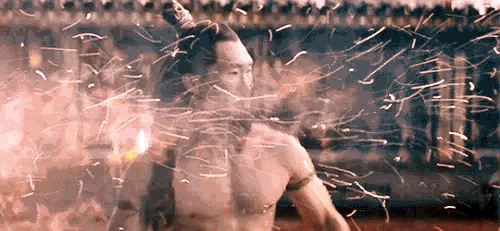

This is because in my headcanon Fire Lady Ilah has a much more kinder, gentler, compassionate, and sympathetic personality than her husband Fire Lord Azulon toward other nations suffering in the Hundred Year War due to her having more of a spiritual connection and having her life saved and spared by a Earth Kingdom Princess. This challenged her Fire Supremacist views of people from the Earth Kingdom and other nations made her contextualize their pain and suffering from nearly a century of nonstop war and violence.
Despite both Ilah and Iroh still being staunch imperialists. Ilah made sure to teach Iroh the values of compassion, mercy, and kindness. These values weren't taught and passed down to Azulon and Ozai in comparison. Nor have Azulon or Ozai ever had their Fire Supremacist views challenge and are heavily impacted by decades of propaganda and hatred created by Fire Lord Sozin.
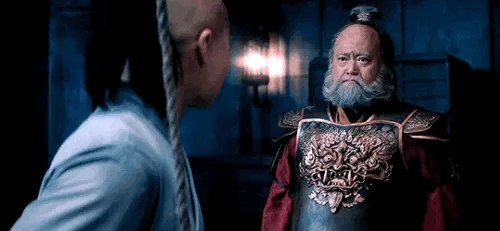
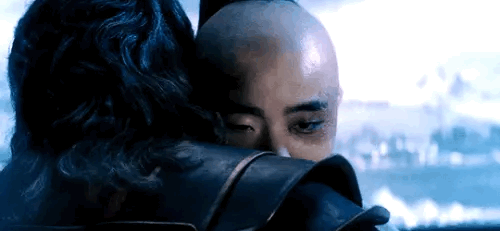
Another headcanon theory of mine is that Fire Lady Ilah died in childbirth while giving birth to Fire Prince Ozai. Iroh was a fifteen-year-old teenager at the time as well. Fire Lord Azulon probably wanted a second child in case of Crown Fire Prince Iroh's possible death on the battlefield along with the return of Sozin’s comet nearly fifty years in the future. However, Ilah probably was in her forties and childbirth was more risky. My dark headcanon is that Baby Ozai burned his mother Ilah from the inside out and the Fire Sages had to perform a lethal C-section on the dying Fire Lady. Fire Lord Azulon loathes his second-born son for being the cause of his beloved wife’s death but this is a coping mechanism due to the fact that Azulon pushed and forced Ilah to have another child.
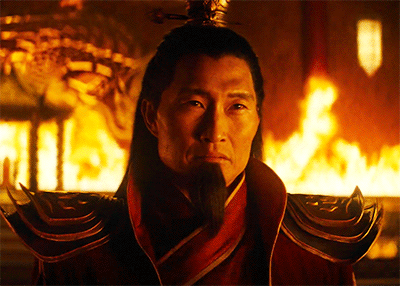
This is the main reason Ozai is more ruthless, brutal, and vicious than his older brother Iroh. Iroh had and took after Ilah's influence and parenting style whereas Ozai had and took after Azulon’s influence and parenting style. Iroh probably is brainwashed and naivete to believe that the Fire Nation truly cares about the prosperity of the other elemental nations whereas as Ozai is extremely realistic and pessimistic regarding the so-called “benevolent” plans for the other nations.
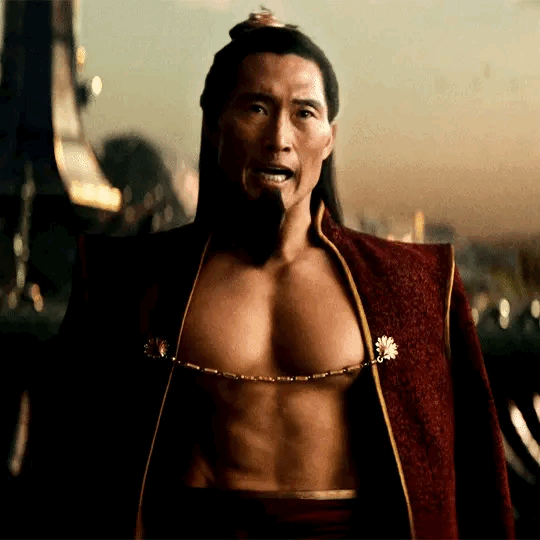
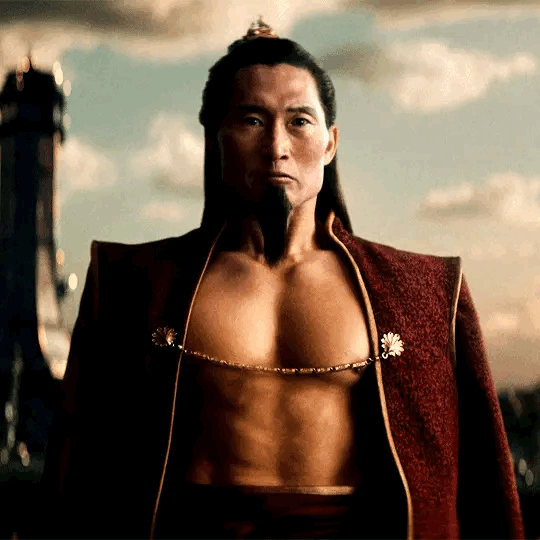
A good comparison between Iroh and Ozai would be Bjorn and Ivar from the Vikings series. Along with the immorality standards of the German Wehrmacht soldiers and SS-loyal nazi soldiers that are completely brainwashed by the ideology of nazism and imperialism.
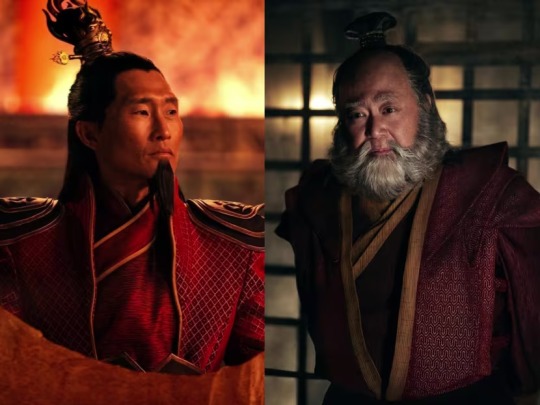
#atla#sozin#ilah#azulon#iroh#ozai#avatar the last airbender#avatar#atla meta#fire nation royal family#fire family#fire fam#fire nation royal family meta#ozai meta#iroh meta
25 notes
·
View notes
Text
Even though I'm very "pro azula redemption" and "pro azulaang." I fully don't blame others who are against both ideas.
Between Ozai and Azula, it's Azula who's the more popular antagonist and the final agni kai was the most popular climax battle.
Ozai is never truly given a chance to prove why he's the better villain and why he's supposed to be Aang's arch-nemesis. The narrative genuinely tries to make Ozai the better villain and his battle with Aang the most climactic out of all other battles but it all falls short.
The most common qualities for an arch-nemesis are that they are the hero's strongest enemy, pose the greatest threat to the hero, are the complete antithesis to the hero, have strong connections with the hero's past, or are the most recurring villain the hero faces. Ozai demonstrates none of these qualities to Aang or anyone on Team Avatar except Zuko.
I don't wish for Azula's villainous feats and the final agni kai to all be erased. I just want them to be surpassed by Ozai's feats and his battle with Team Avatar. Make it to where Team Avatar would need Azula's, Mai's, and Ty Lee's help in dealing with Ozai. Make it to where Aang would need to not only master every bending art he has to their fullest extent but do the same with all possible specialized sub-bending techniques along with non-bender skills, his chakras, and his avatar state.
These are the reasons why I was determined to reimagine Ozai as the instigator of the great war and/or a dark avatar whose secret/true identity is actually Vaatu himself.
15 notes
·
View notes
Text
But isn't that the whole point of his character, or at least a major point? Ozai is the physical embodiment of the Fire Nation's ills and what a hundred years of war, colonization, and genocide has done its collective psyche: a nation that supposedly prides itself on being honorable and spreading its "glory", but in reality is a nation of monstrous, dishonorable, ignorant cowards who do nothing but spread pain and destruction and who have no respect for anything or anyone, including themselves.
Ozai being a coward who hides behind his teenage daughter and is only seen fighting a 12 and 13 year old, losing to the former at his most powerful no less, is perfectly in-line with his character. If anything, Ozai being portrayed as a courageous warrior who is seen on screen fighting and defeating component adult fighters would have defeated the point of his character.
Ozai is genuinely such a coward. Like... on the Day of Black Sun he was completely okay with hiding behind his guards in a secret chamber while Azula, his daughter, who also had no bending faced Aang, Sokka and Toph. Her job was to literally distract them and protect him? I'll remind you the only fights we've ever seen with Ozai are between him and Zuko (his SON who was 13 and wouldn't fight back) and the twelve year old Avatar who he was prepared to murder.
241 notes
·
View notes
Text
Sometimes I think about exactly how powerful Zuko’s story as an abuse victim is and I just have to stop and tear up for a minute.
Just let it sink in that at 13 years old, Zuko’s father mutilated him in front of an audience and told him he was worthless and unwelcome until he completed an impossible mission. Nobody stepped in to help him. Most onlookers thought he deserved it, and even Iroh was too afraid of Ozai to challenge him in Zuko’s defense.
Zuko went on for years believing Ozai was right, and didn’t recognize what happened to him as abuse. He thought his banishment and suffering were his own fault because something was wrong with him, and that it was his duty to change to become worthy again.
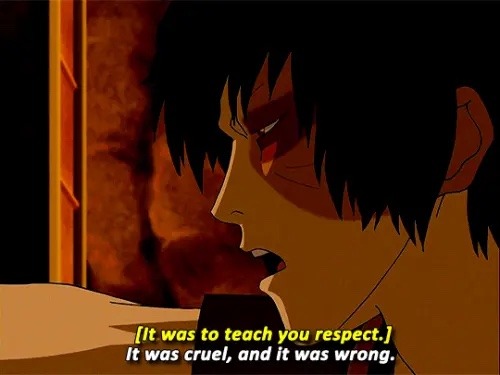
Then this scene? Absolutely incredible.
Zuko’s whole journey leads up to this confrontation, where he not only recognizes that he holds no responsibility for the abuse inflicted on him; he confronts his abuser and tells him he was wrong to treat him that way, that he doesn’t owe his abuser anything.
And not only that, Zuko also tells Ozai that he sees how he’s hurting the rest of the world the same way he hurt him, and vows to stop him. That’s literally so powerful, especially watching this as someone who once felt as broken and alone as Zuko once did. His story is everything to me.
11K notes
·
View notes
Note
Can I ask why you think the way Azula treated Zuko was not abusive?
To understand why Azula was not abusive to Zuko, we need to understand what IS abusive. I'm not exactly an expert in the field of abuse as there are many kinds of abuse. However, I do feel that the National Domestic Violence Hotline on their website www.thehotline.org does give us at least a basis to start off with in terms of this kind of abuse that Azula is accused of.
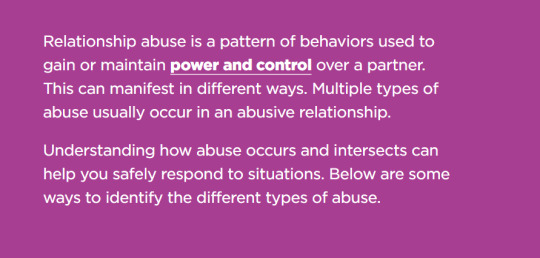
Essentially, if Azula were trying to exert any form of power or control over Zuko, we could consider that to be abusive. She would come from a position of power and use that to browbeat Zuko into submission. Whereas the latter wouldn't be able to do anything about it due to that power dynamic I mentioned. Either that or Zuko wouldn't know it was abuse since it was so engrained in their dynamic.
Thing is...Zuko never shows signs of being abused by Azula.
Whenever Azula mocks him or taunts him, he fires back. He's not afraid to speak his mind. We saw that all the time in "Zuko Alone". Indeed, he doesn't show any signs of being afraid of her or any sign of her exerting any sort of power over him. The closest we came to that was during the bedroom scene where she dangles the possibility of the Avatar over his head, but even that's debatable since he was the crown prince AND barged in with a bad mood already.
So clearly, Zuko didn't feel threatened by Azula at all. And if their dynamic had him fire back at her just as much as she did towards him, how can that be considered abuse?
But what I think is most telling is that we do have an example of abuse in the cartoon. And it does involve Zuko and everything that I just mentioned.
It's just, it wasn't Azula.
It was Ozai.
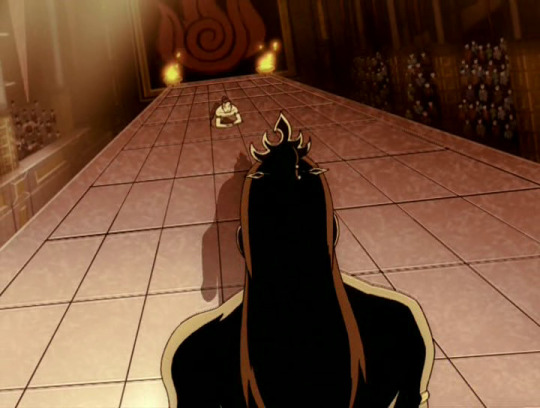
Putting aside the scar on his face, Zuko's relationship with Ozai DOES reek of abuse. I made a whole post about it, but the point is, Zuko never feels comfortable about speaking out against Ozai or fighting against him. The only time he does is when he has a bit of an advantage, but that was only to escape and not kill.
Zuko will speak out against Azula. But Ozai? No way. He'll take Ozai's comments, and internalize them to make himself feel weak as he does throughout the series. Hell, his rivalry with Azula is Ozai setting them against each other just like any abusive parent would do.
In short, Zuko's dynamic with Azula is the complete opposite of Ozai. And since we know that Ozai is an abusive father, I cannot for the life of me see Azula being at the same level. At worst, she was a symptom of the problem. Not the problem itself. And if you want to address the topic of abuse, you need to get at the source.
#azula#princess azula#zuko#prince zuko#ozai#fire lord ozai#ozai's grade a parenting#azula meta#zuko meta#ozai meta#avatar: the last airbender#atla#atla meta#ask answered#anon ask#anon answered#ask me anything
67 notes
·
View notes
Note
Do you agree with this take about Ozai?
https://www.tumblr.com/phoenix-king-ozai/662589960179810304/ozai-did-love-and-care-about-his-family-in-the?source=share
I understand where this comes from, I've seen takes similar to this one a couple of times, however, I only partially agree.
The thing about abusers is that they're humans too, so there can be some good moments and happy memories with them, but that doesn't necessarily mean they genuinely loved you. People point to the flashbacks as a proof that Ozai had complex feelings towards his children, but I think he never really cared about them in a way we understand it.
I think in Ozai's case, he didn't truly love their children, BUT, as a human, he just had some parental instinct towards them, as shown when Ozai saved Zuko.

But to me, Ozai is still a clear case of a narcissistic parent and parents like this never love their children unconditionally. We've seen that later in the show Ozai gives his children only conditional approval.
I think Ozai's early care for Zuko also stemmed from the fact that he wasn't seen by him as a lost cause yet. I think the time when Ozai showed kindness to Zuko, was a time when Ozai still hoped Zuko would prove himself.

His later resentment of Zuko comes from the fact, that, in his eyes Zuko isn't a capable heir. He isn't a prodigy firebender, he's not tactical, he doesn't demonstrate great political skills. Zuko doesn't have any of he skills Ozai values.

Ozai welcomed Zuko back after his banishment, because Zuko has finally become what Ozai always wanted.
Same with Azula. As long as she answered to his expectations, he showed her some resemblance of "care", but after he found out she lied to him, I think he became displeased with her and abandoned her in the end. (But she's still his only heir left, so he gave her the position of the fire lord as a way to "shut her up" and still keep her by his side).

We see that all love Ozai has for his children is conditional. And I believe there was a one more reason as to why Ozai semeed to care for his children in the past, but became cold to them later.
This post correctly points to Ozai and Ursa having a good early relationship in canon. Maybe Ozai hadn't lost his feelings towards Ursa, but when she's gone, there was no one to keep his cruelty in check anymore.


When Ursa was present, Ozai tried to be better and make it all work, but she still couldn't tame his ambitions and after she left, it was like all of his soft feelings he may have towards his family and his children were gone with her.
#atla#ozai#fire lord ozai#ozai meta#fire nation royal family#ursa#zuko#azula#asks#answering asks#avatar#avatar the last airbender
29 notes
·
View notes
Text
The only thing I'll add is that Ozai already had one "failure" of a child, and so, he wasn't going to accept another "failure", with Azula, along with the rest of the Royal Family, knowing this to be the case.
This whole Azula being born lucky and Zuko being lucky to be born... Azula would have to be "lucky". If she was "normal" like Zuko, she would be dead
At 13, Zuko was a child you couldn't justify duelling, a boy who needed protection and was deserving of compassion.
At 14, Azula is a soldier. A fire bending weaoon who is none of the things that Zuko was, because she wears makeup, is sharp tongued, and fights in a ruthless way that's conducive to her environment
All the things she does in the show are insane. Her physical feats and the expectations set on her by Ozai. You're not just born that good. You train, and you train hard, and if you're talented, that training won't kill you, and you won't buckle under the pressure
She was literally a kid with no choice but to be better at war than all the adults around her. Ozai expected her to be his right-hand man or nothing at all
#azula#zuko#ozai#fire siblings#azula meta#zuko meta#ozai meta#fire siblings meta#azula is a victim of grooming#azula is a child solider
315 notes
·
View notes
Text
What Ozai was proud of Zuko for
Ozai: I am proud of you, Prince Zuko. I am proud because you and your sister conquered Ba Sing Se. I am proud because when your loyalty was tested by your treacherous uncle, you did the right thing and captured the traitor. And I am proudest of all of your most legendary accomplishment: you slayed the Avatar.
Zuko: [Shocked.] What did you hear? Ozai: Azula told me everything. She said she was amazed and impressed at your power and ferocity at the moment of truth.
Interesting, if not unexpected list:
Showing "military prowess" and proper imperialism by conquering Ba Sing Se(even though Azula did 95% of the actual work, although we're not sure how she presented things to Ozai). There's a reason that Zuko was welcome at future war meetings after this.
Proving "true loyalty" by rejecting his treacherous uncle's pleas (true, although Azula probably emphasized this as much as possible) and "capturing Iroh" (false, Azula and her Dai Li agents did 99% of the actual work there, but Azula isn't going to tell Ozai that).
Killing the Avatar with "power and ferocity"(false, Azula is the one who did that). I think it's easy to see why Ozai is impressed by this.
#Ozai#Zuko#Azula#Ozai meta#Zuko meta#Azula meta#just a little post#Azula seems to have been “misleading” about a lot
42 notes
·
View notes
Note
Can you elaborate on how Ozai neglected his spirituality? What does it even mean in atla setting, to be spiritual? I mean Ozai was a shitty person but he was ambitious and resilient about his purpose, so I don't really get why his spirit was overpowered by Aang's.
It means what it means literally, Ozai only cared about material things, his strength, his power, his territory, his wealth, with no care for spirituality like caring for the order and balance of the world, learning about other people and empathizing with them, understanding that he's just one part of a bigger whole and that other people matter too.
As well as straight up having no respect, care or understanding of actual factual spirits or nature.
His purpose was purely ego driven / materialistic, it's not spiritual at all and that's why he lost to Aang in the end, if his spirit had been just a bit stronger, Aang would have been the one who lost his bending.
Thanks for the ask ^^
#atla#avatar the last airbender#ozai#aang#ozai meta#aang meta#atla meta#fire nation#thanks for the ask ^^
26 notes
·
View notes